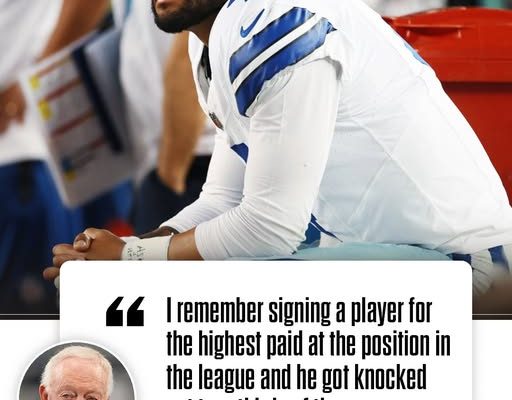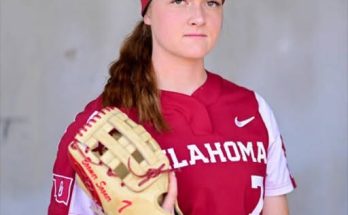In a turn of events that has sent shockwaves through the NFL, the once-unflappable relationship between the Dallas Cowboys and their generational talent, Micah Parsons, has unraveled in a public and dramatic fashion. The saga, which has been simmering for months, reached a boiling point on August 1, just eleven days after an apparently contradictory statement from Cowboys owner Jerry Jones. This is not simply a contract dispute; it’s a clash of wills, a battle for leverage, and a stark reminder of the often-personal nature of professional sports negotiations, even at the highest levels. The fallout has placed the Cowboys franchise, a team built on star power and a national spotlight, in a precarious position as they head into training camp, facing a potential holdout from their best player and an uncertain future for a defense that has, for years, been carried on the shoulders of the “Lion-backer.”
The story begins on July 21, during Jerry Jones’s annual pre-training camp press conference. It’s an event that has become a yearly spectacle, with Jones often providing soundbites that range from insightful to baffling. This year, the focus was squarely on the contract extensions for two of the team’s cornerstones: quarterback Dak Prescott and, more pressingly, Micah Parsons. With Parsons entering the final year of his rookie deal, and with the market for elite pass-rushers exploding, reporters pressed Jones on his willingness to pay. In a comment that would become a flashpoint for the ensuing chaos, Jones stated he had a history of paying players, and even referenced signing a player to the highest-paid deal at their position. He mentioned the commitment to Dak Prescott and CeeDee Lamb, seemingly trying to convey a message that he wasn’t afraid to spend. Yet, a specific and critical detail in his statement seemed to contradict the very notion of a smooth negotiation. He referenced an injured player, Dak Prescott, and a prior high-dollar contract, and the comments were perceived as an unusual and public-facing jab at a player’s injury history. This public posturing, from a man known for his calculated media presence, was the match that lit the fire.
For Micah Parsons, who had reportedly been seeking a formal negotiation with the team for months, the frustration had been mounting. He had spent the offseason watching other top defensive players like Myles Garrett and T.J. Watt sign massive, market-setting deals. Parsons, in his four seasons, has been arguably more impactful than any of them, a two-time All-Pro and a consistent Defensive Player of the Year candidate who has never had a single season with fewer than 12 sacks. His production is historic, and his versatility is unparalleled, yet the Cowboys had been seemingly dragging their feet. The team had made an offer, but according to Parsons’ camp, it was based on a “closed-door” conversation he had with Jones in March, a conversation that Parsons believed was a preliminary discussion about leadership and not a formal negotiation.
On August 1, the simmering tension erupted into a full-blown crisis. Parsons took to social media, posting a lengthy, emotional, and meticulously detailed three-page note on X (formerly Twitter). The message began with a seemingly grateful “Thank you Dallas” before launching into a blistering account of his contract dispute. He revealed that he had been in communication with Jones about an extension, but that the Cowboys had refused to negotiate with his agent, David Mulugheta. Parsons’ statement was a direct refutation of the team’s public narrative, painting a picture of an organization that was attempting to circumvent his agent and was, in his view, creating “narratives” to damage his public standing. He pointed to Jones’s comments from July 21 as a final straw, a public shot at his health and dedication that he could no longer tolerate. The post ended with the bombshell: “I no longer want to be here,” and a declaration that he had formally submitted a trade request to COO Stephen Jones.
The reaction was immediate and seismic. The sports world, from analysts to former players, was stunned. The notion of a generational talent, a franchise cornerstone, demanding a trade just weeks before the season was almost unthinkable. For Cowboys fans, it was a moment of profound dread, a replay of the contract sagas that have haunted the team for decades, from Emmitt Smith to Dez Bryant. The #PayParsons hashtag, which had been a rallying cry for months, became a furious protest. Players, both current and former, weighed in. CeeDee Lamb, who had just gone through his own protracted contract negotiation, simply tweeted, “Just pay the man.” Dez Bryant, who had his own tumultuous breakup with the team, came out in support of Parsons, condemning the team’s negotiation tactics.
Jerry Jones, in his response, attempted to downplay the situation, calling it “negotiation talk” and telling fans, “Don’t lose any sleep over it.” He doubled down on his belief that a framework for a deal was already in place from his March conversation with Parsons. However, his words did little to soothe the situation. His dismissal of Parsons’ heartfelt statement as a simple bargaining tactic only seemed to confirm the very problem Parsons was highlighting: a lack of respect and a failure to engage in formal, good-faith negotiations. For a player who has given everything to the organization, who has been the undisputed heart and soul of the defense, such a response from ownership only deepened the chasm between the two sides.
The situation has put the Cowboys in a brutal bind. On one hand, they have a once-in-a-generation talent under contract for one more year, and they can use the franchise tag in 2026. This gives them significant leverage, as Parsons would have to take the drastic measure of a holdout to truly force their hand. A holdout, in turn, would cost him millions and potentially damage his standing with fans. On the other hand, the public nature of the feud and the sheer talent of Parsons mean that every team in the league is now watching, with many already formulating potential trade packages. The asking price for a player of his caliber would be historic, likely involving multiple first-round picks, but for a team on the verge of a Super Bowl, a player like Parsons is priceless.
The future is now intensely uncertain for both the player and the team. The Cowboys have a history of not trading their superstars, but this situation feels different. The public animosity, the specific accusations of disrespect, and the breakdown of communication with his agent suggest a level of broken trust that may be beyond repair. Parsons has made it clear that he wants to be paid what he’s worth and to be treated with the respect he feels he has earned. Until then, the Dallas Cowboys will be a team on the brink, and the question of whether they can mend this fractured relationship will be the most compelling storyline in the NFL as the 2025 season approaches.



